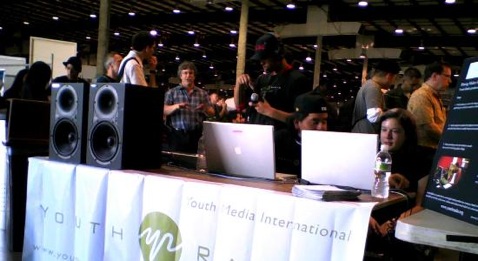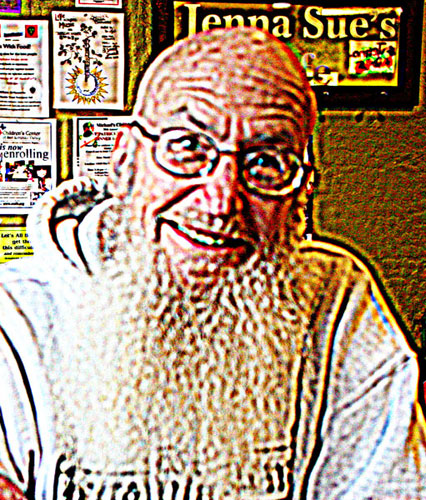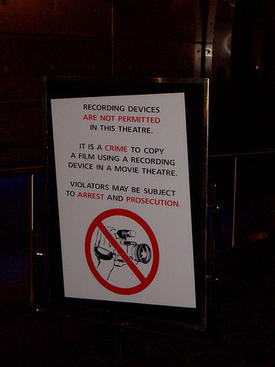The Latest from Boing Boing |  |
- Temple University Med School: Skull yearbook, 1942
- Homeless people and the Internet
- Laser-cut Team Fortress mobile
- Richard Feynman plays the bongos
- Youth Radio remixes Maker Faire
- Weird Science
- Canadian cinema fined $10,000 for privacy invasion over bag-search
- Podcast horror story about wanting to fly
- Mickey-ears skull ring
| Temple University Med School: Skull yearbook, 1942 Posted: 30 May 2009 10:46 PM PDT  This is the 1942 yearbook from the Temple University School of Medicine. The design of the embossed leather cover drives me wild. It's on eBay right now with a buy-it-now price of $1495. This is the 1942 yearbook from the Temple University School of Medicine. The design of the embossed leather cover drives me wild. It's on eBay right now with a buy-it-now price of $1495. Temple University School of Medicine Skull Yearbook |
| Homeless people and the Internet Posted: 30 May 2009 10:13 PM PDT The Wall Street Journal's Phred Dvorak has a thought-provoking feature on the use of laptops and Internet services by homeless people, who, like everyone else, use them for civic engagement with politicians, social interaction, job hunting, and entrepreneurial pursuits. Here's a prediction: in five years, a UN convention will enshrine network access as a human right (preemptive strike against naysayers: "Human rights" aren't only water, food and shelter, they include such "nonessentials" as free speech, education, and privacy). In ten years, we won't understand how anyone thought it wasn't a human right. And even then, there will be destitute former music execs, living rough on the streets, using their laptops to argue that no, it's not a human right: you should be deprived of your Internet access if you're accused of copyright infringement, because the Internet is just a machine for making copies of trivial, copyrighted entertainment products. On the Street and On Facebook: The Homeless Stay Wired (via Isen) (Image: Brian L Frank for the Wall Street Journal) Previously: |
| Laser-cut Team Fortress mobile Posted: 30 May 2009 10:56 PM PDT Over on Offworld, our Brandon's spotted a stellar Team Fortress-themed mobile: If there's a Left 4 Dead one, I'm doomed -- it's all the wife can talk about these days; we'd end up with one in ever room, and Alice running around making pew-pew noises at them. |
| Richard Feynman plays the bongos Posted: 30 May 2009 10:48 PM PDT |
| Youth Radio remixes Maker Faire Posted: 30 May 2009 09:24 PM PDT  My friends from Youth Radio were at the Maker Faire Bay Area today, creating a live soundscape. Students roamed the fairgrounds collecting audio samples on flash recorders. As the roving reporters brought back their "tape" to the Youth Radio booth, others used Peak and Reason software to cut-up, loop, and collage the audio into a sick soundscape. The young people on the scene were Kenyon Colvin-Williams, Skyler Brynat, Luis Florez, Derrick Underwood, Khadejhia Kassenbrock, and Austin DeRubira. Production support came from Ben Frost, Charlie Foster, and Rachel Krantz. Mixing Maker Faire Previously:
|
| Posted: 30 May 2009 11:33 AM PDT (Rudy Rucker is a guestblogger. His latest novel, Hylozoic, describes a postsingular world in which everything is alive.) Looking back over the advance of physics over the last two hundred years, it's staggering to realize how much our world view has changed. As a science fiction writer, I'm always trying to imagine how much more things might change in the coming two centuries. The really hard thing to anticipate is the completely game-changing advances that occur every so often. My sense is that, for one thing, we won't be using chip-based computers in two hundred years---any more than we use mechanical calculators now. That's why, in my recent novels Postsingular and Hylozoic, I've been speculating about a world in which our computations escape from our machines and filter into our ordinary matter.
Nick Herbert is one of my favorite offbeat physicists. One of his papers in particular is something I've thought about a lot over the years: "Holistic Physics, or, An Introduction to Quantum Tantra." Here Nick argues that our conscious minds display some of the same features as quantum mechanics. When we're not thinking about anything in particular, our thoughts evolve in a continuous, multi-universe kind of way---but when we focus on something, we carry out something like the quantum collapse that characterizes the process of measurement.
[Brain models from the Collection of Historical Scientific Instruments at Harvard University.] As I've been saying, I think it's at least in principle possible that the quantum computations in ordinary matter might be capable of carrying out these same kinds of processes---which we normally associate with living, conscious minds. And Nick's paper helps you to think about this idea. David Deutsch wrote a deep and technical paper about the topic of computation in arbitrary pieces of matter, called "Quantum theory, the Church-Turing principle and the universal quantum computer." The basic idea is that quantum mechanical systems can act as universal computers, and it's generally believed that any universal computer can emulate a human mind (given the right program, and, aye, there's the rub). One of our big problems is that we still have such an imperfect notion of how to build a software system that's like a human mind. The best idea along these lines that I've seen in the last few years is in the book On Intelligence, by Jeff Hawkins and Sandra Blakeslee.
Two more rich sources for futuristic ideas. (1) The arXiv.org site---for instance look at their New Papers on Cosmology and Extragalactic Physics page. It blows my mind that you can so easily access all these wild new papers, easily readable in PDF form. Even if, for the average person, a lot of the writing is incomprehensible gibberish (like the backwards neon sign shown above), you can skate through and pick up some great concepts and buzzwords. (2) The physicist John Baez's pages. Baez is a deep thinker and a gifted popularizer, adept at imparting the true strangeness of this world. It's liberating to realize that, as always, we're very much on the edge of knowing what's really going on. |
| Canadian cinema fined $10,000 for privacy invasion over bag-search Posted: 30 May 2009 11:31 AM PDT Patrick sez, "A Canadian cinema has been fined C$10,000 for invasion of privacy when it searched a mother and daughter's bags for video cameras, but instead pulled out birth control pills from the daughter's purse. The mother had no idea. She sued. She won." Cinema ordered to pay $10K in damages for search (Thanks, Patrick!) |
| Podcast horror story about wanting to fly Posted: 30 May 2009 06:24 AM PDT This week on the most excellent Pseudopod horror podcast, David Nickle's fantastic story "The Inevitability of Earth," a tale about the ignobility of those who would fly:
Dave's got a new short story collection coming soon, available for pre-order: Monstrous Affections. Pseudopod 144: The Inevitability of Earth Previously: |
| Posted: 30 May 2009 06:16 AM PDT |
| You are subscribed to email updates from Boing Boing To stop receiving these emails, you may unsubscribe now. | Email delivery powered by Google |
Inbox too full?  | |
| If you prefer to unsubscribe via postal mail, write to: Boing Boing, c/o Google, 20 W Kinzie, Chicago IL USA 60610 | |





 Staff at the theatre were searching customers' bags for video equipment that could be used for movie piracy.
Staff at the theatre were searching customers' bags for video equipment that could be used for movie piracy.  When Michael was just a kid, Uncle Evan made a movie of Grandfather. He used an old eight-millimeter camera that wound up with a key and had three narrow lenses that rotated on a plate. Michael remembered holding the camera. It was supposedly light-weight for its time, but in his six-year-old hands, it seemed like it weighed a ton. Uncle Evan had told him to be careful with it; the camera was a precision instrument, and it needed to be in good working order if the movie was going to be of any scientific value.
When Michael was just a kid, Uncle Evan made a movie of Grandfather. He used an old eight-millimeter camera that wound up with a key and had three narrow lenses that rotated on a plate. Michael remembered holding the camera. It was supposedly light-weight for its time, but in his six-year-old hands, it seemed like it weighed a ton. Uncle Evan had told him to be careful with it; the camera was a precision instrument, and it needed to be in good working order if the movie was going to be of any scientific value.  The Great Frog's Michael Mouse Ring is a sweet chunk of chunky, infringing silver: a skull in Mickey ears.
The Great Frog's Michael Mouse Ring is a sweet chunk of chunky, infringing silver: a skull in Mickey ears.
No comments:
Post a Comment